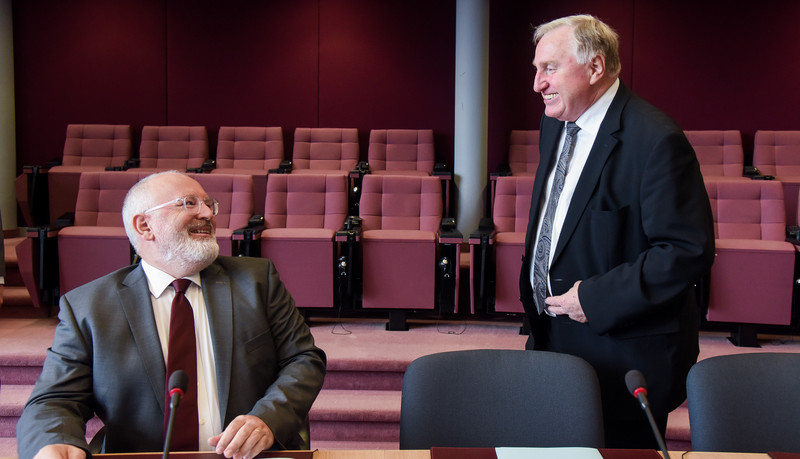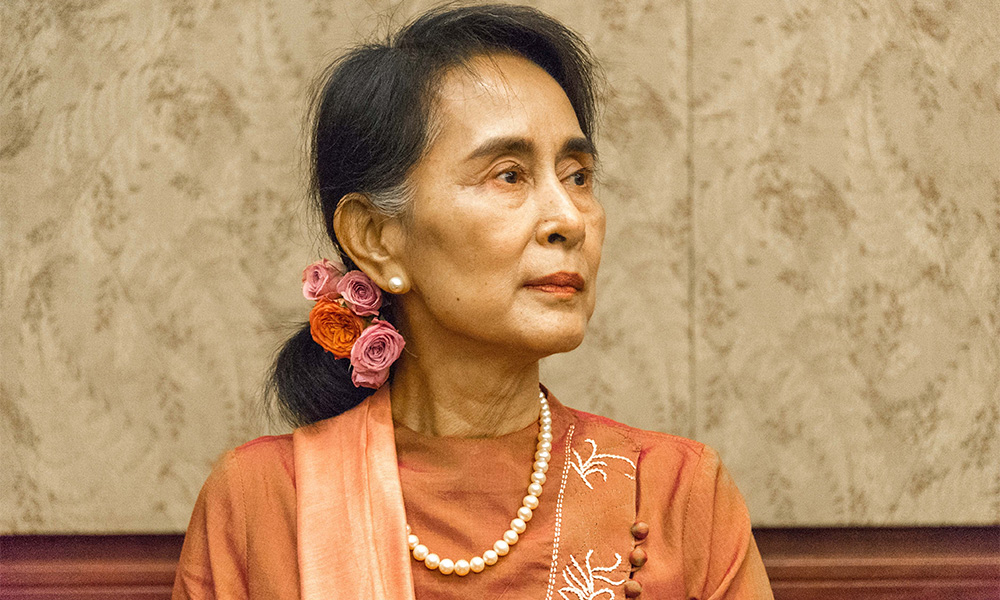EU Observer (15 October 2018)
An election battle between French president Emmanuel Macron's pro-European vision and Hungarian prime minister Viktor Orban's nationalist views could make more people interested in voting in May's European parliament elections.
It would make people realise that there is a real battle for Europe's soul going on and that voters need to turn out and vote, experts told EUobserver.
But it would not fix the under laying democratic problems, they said.
"We may have a more lively and high-profile campaign leading up to the elections next year - paradoxically, precisely because there is a new potential kind of populist alliance," Richard Youngs, a senior fellow at the Carnegie Europe think tank and author to the book, Europe Reset: New Directions for the EU, told EUobserver.
A higher turnout should be good news for the European Parliament, which has seen participation fall in all previous elections.
The election turnout was 61.9 percent in the first direct European parliament election in 1979, and has dropped in every single election ever since, to just 42.6 percent - the lowest ever - at the last election in 2014.
"The turnout will not decline any further," predicted another observer of European democracy, Dominik Hierlemann at the Bertelsmann Stiftung's Future of Democracy programme.
"But we will get more populists into parliament," he warned.
"There will be new alliances, perhaps, in the parliament - and with a very clear risk that the 'old alliance', between the social democrats and conservatives, won't have the majority in parliament anymore," he said.
"It is important that pro-European forces head to the polls. A high voter turnout would definitely strengthen EU democracy but I am worried that we will get a more populist EU parliament, with a lot of members that are more interested in disintegrating the EU, and less interested in full EU integration," Hierlemann added.
Simplified debate
Both researchers made their warning clear while speaking to EUobserver in relation to the first State of the Union Citizens' Rights conference in Brussels.
"In a way, a 'Macron vs Orban' contest would represent a kind of step backwards towards having a simplified debate between pro-Europeans and anti-Europeans," Carnegie's Youngs said.
"The EU needs a slightly deeper debate, with some more positive ideas on how the EU itself can change," he said.
"Defining everything in terms of pushing back the populists in a way builds them up and gives them perhaps too much influence in setting the agenda. Conversely, in some cases it perhaps demonises them when actually we should be understanding the underlying causes of why these parties have become so popular," Youngs explained.
"The EU [should] try to respond to those problems, that have lead people into the arms of these parties," he recommended.
'Spitzenkandidat' process
In a bid to make the European elections more democratic and interesting, the parliament introduced the so-called 'Spitzenkandidat' (from the German for 'lead candidate') process at the last 2014 election.
The idea resembles a parliamentary democracy at the national level, where the party (or a coalition of parties) winning most seats in the parliament forms the government and its leader become prime minister or chancellor.
Jean-Claude Juncker ran as Spitzenkandidat for the European People's Party (EPP) in 2014 and thus became president of the European Commission, because his party won most seats in the parliament election.
But doubts have emerged around the Spitzenkandidat process this time, with the prospect of nationalist-conservative and EU-sceptic parties growing.
French president Macron's La Republique En Marche party has already said it would not support a repeat of the process.
The experts are also sceptical.
"I don't think we should pin the whole of the EU's future on these elections. Or think that if the more pro-European side comes out with more votes than the populist side, that in itself will invigorate European democracy," said Youngs.
"We can't fix it with just the old means, and it is not enough to say we've got the Spitzenkandidat [process] – this is not the magic bullet for a lively EU democracy. There needs to be more innovation than just that," added Hierlemann from the Bertelsmann Stiftung.
Involving citizens
New forms of democracy are needed, they both pointed out.
Citizens must be more directly involved and at an earlier stage in the political process via citizens consultations.
"It is not about competition between different forms of democracy – it is about trying to connect these different forms to have a better democracy for the people," Hierlemann said.
"EU democracy is still a very elitist thing - trying to sell EU politics to the average citizens. But this is not about selling. I mean, if you want to 'sell democracy', you are already a little bit lost," he said.
"We've got to involve people – they should have a chance to participate, and this is where we need to shift our perspective from communication and more towards participation," he said.
A "Citizens' Panel" on the future of Europe took place between 4 and 6 May 2018, and brought together 100 citizens from all 27 EU member states to discuss the future of Europe.
The participants were selected at random in order to represent the diversity of the EU and its citizens, with Hierlemann and his colleagues at the Bertelsmann Stiftung acting as an academic partner.
"This could be one of many possible ways of preventing the further disconnect of citizens from European politics and policymaking," the project found.
Big cities showing the way
Youngs also advocated more democratic input directly from citizens and at an earlier stage in the policy process.
He pointed out that big cities are producing new forms of democracy, that the EU could learn from.
"Some of the most dynamic activities are taking place in cities," he said.
"Interestingly some of the big cities around Europe, where people were feeling the effects of the economic crisis and began to organise – not big idealistic European visions, or visions for the EU - but simply to manage local finances, getting corruption and nepotism out of local administration, schools, parks, transport and local health services. Trying to mitigate the effects of the crisis. It has galvanised more of a civic spirit," said Youngs about a possible way forward.
"The EU needs to move with the times and modernise itself. The way societies have access to information and how that relates to a political system has changed completely over the last 30 or 40 years. But the EU institutions haven't yet moved with that completely," said the Carnegie expert.
"The EU needs to be a lot more open to take citizens' views onboard. They have been saying that for 20 years, but in practice nothing very concrete is being done. If you look at all the surveys, people feel disenfranchised."
"The Commission does a lot of good work on consulting with citizens and running citizens dialogues but it is all very carefully managed and it is organised very much around an EU script: here are the ideas – do you citizens agree with us?," Youngs said.
"We ought to be concerned - but also avoid some of the more sensationalist talk about Europe being on the verge of a new wave of authoritarianism," he concluded.
No comments yet.
-
 HOW JUNCKER'S 'DO LESS' GROUP CONCLUDED EU SHOULD NOT DO LESS
Europe - EU
16.10.2018
HOW JUNCKER'S 'DO LESS' GROUP CONCLUDED EU SHOULD NOT DO LESS
Europe - EU
16.10.2018
-
 ASEAN HAS TO STAND UP AND BE COUNTED ON MYANMAR
Asia - Pacific
16.10.2018
ASEAN HAS TO STAND UP AND BE COUNTED ON MYANMAR
Asia - Pacific
16.10.2018
- POPULATION GROWTH IN IRAQ RAISES CONCERNS Iraq 16.10.2018
-
 ‘NEW SOUTHERN POLICY’ ENCOURAGES FINANCIAL COMPANIES TO LOOK TO SOUTHEAST ASIA
Asia - Pacific
16.10.2018
‘NEW SOUTHERN POLICY’ ENCOURAGES FINANCIAL COMPANIES TO LOOK TO SOUTHEAST ASIA
Asia - Pacific
16.10.2018
- AZERBAIJAN DEFENSE MINISTER DUE IN CZECH REPUBLIC The Caucasus and Turkish-Armenian Relations 16.10.2018
-
19.04.2024
Türk-Ermeni İlişkileri Üzerine Ömer Engin Lütem Konferansları 2023 -
11.04.2023
Türk-Ermeni İlişkileri Üzerine Ömer Engin Lütem Konferansları 2022 -
27.03.2023
RADİKAL ERMENİ UNSURLARCA GERÇEKLEŞTİRİLEN MEZALİMLER VE VANDALİZM -
17.03.2023
PATRIOTISM PERVERTED -
23.02.2023
MEN ARE LIKE THAT -
03.02.2023
BAKÜ-TİFLİS-CEYHAN BORU HATTININ YAŞANAN TARİHİ -
16.12.2022
INTERNATIONAL SCHOLARS ON THE EVENTS OF 1915 -
07.12.2022
FAKE PHOTOS AND THE ARMENIAN PROPAGANDA -
07.12.2022
ERMENİ PROPAGANDASI VE SAHTE RESİMLER -
30.03.2022
Türk-Ermeni İlişkileri Üzerine Ömer Engin Lütem Konferansları 2021 -
01.01.2022
A Letter From Japan - Strategically Mum: The Silence of the Armenians -
01.01.2022
Japonya'dan Bir Mektup - Stratejik Suskunluk: Ermenilerin Sessizliği -
11.02.2021
Türk-Ermeni Uyuşmazlığı Üzerine Ömer Engin Lütem Konferansları 2020 -
03.06.2020
Anastas Mikoyan: Confessions of an Armenian Bolshevik -
08.04.2020
Sovyet Sonrası Ukrayna’da Devlet, Toplum ve Siyaset - Değişen Dinamikler, Dönüşen Kimlikler -
18.03.2020
Türk-Ermeni Uyuşmazlığı Üzerine Ömer Engin Lütem Konferansları 2019 -
08.03.2019
Türk-Ermeni Uyuşmazlığı Üzerine Ömer Engin Lütem Konferansları 2018 -
12.06.2018
Ermeni Sorunuyla İlgili İngiliz Belgeleri (1912-1923) - British Documents on Armenian Question (1912-1923) -
02.12.2016
Turkish-Russian Academics: A Historical Study on the Caucasus -
01.07.2016
Gürcistan'daki Müslüman Topluluklar: Azınlık Hakları, Kimlik, Siyaset -
10.03.2016
Armenian Diaspora: Diaspora, State and the Imagination of the Republic of Armenia -
24.01.2016
Ermeni Sorunu Temel Bilgi ve Belgeler (2. Baskı)
-
AVİM Conference Hall 24.01.2023
CONFERENCE TITLED “HUNGARY’S PERSPECTIVES ON THE TURKIC WORLD"









